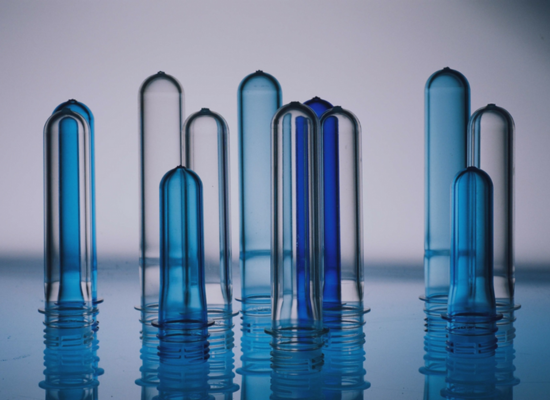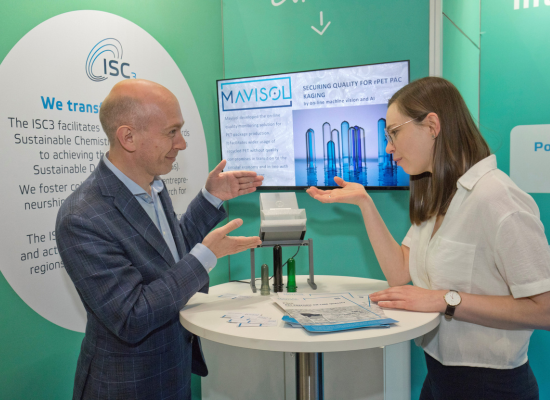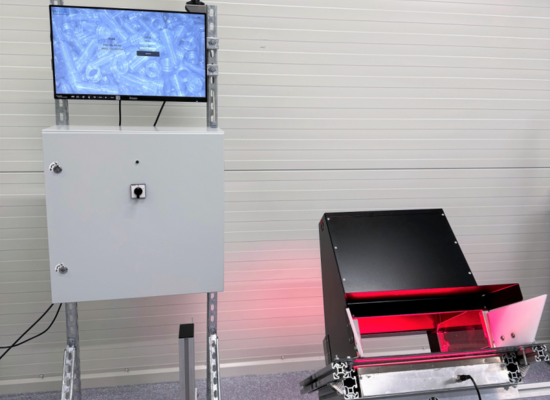Combining competence for a shared (machine) vision
Mavisol is a high-tech spin-off of a startup from Lithuania. In 2020, the directors of the Lithuanian startup “Sprana”, now two of Mavisol´s co-founders, were asked by a leading Northern European PET packaging producer to solve a problem with colour quality inspection of PET preforms. The team decided to develop a new machine vision system for colour inspection. The machine vision system was developed and installed at the factory. As a result, the PET packaging producer was granted the Coca-Cola supplier of the year award in 2022. This success propelled the team to test the first prototype at more preform producers in Lithuania and Ukraine.
The subsequent tests were very successful and confirmed the interest of the customers as well as the economic benefits for the PET preform manufacturers. In particular, one customer reported a tenfold reduction in quality claims during the three-month trial period. All prototypes were purchased after the trial periods.
The decision to establish an independent startup was made in 2022. Mavisol B.V. was incorporated early in 2023 at Brightlands Chemelot Campus in Limburg to be in the middle of a unique polymer ecosystem.
“This location facilitates fast penetration into the Western European market and provides access to highly qualified staff, potential consultants and engineering partners in the Netherlands”
, explains Nikolai Bredelev, co-founder and CEO of Mavisol. The team is a balanced mix of five competent co-founders and one employee with different expertise in chemical engineering, process automation, R&D and business management. Nikolai Bredelev (CEO) is an experienced manager, sales and service engineer. Because of his past valued cooperation with Sprana, he was invited by the latter to join Mavisol. Vladislav Suchkov (R&D director), has led many successful IT projects focusing on process automation and computer vision development in different countries. Dr. Kęstutis Prušinskas (CTO), is an experienced instrumentation designer and researcher with a degree in Physical Chemistry. Mindaugas Steponavičius and Dr. Raimundas Steponavičius are members of the board and advise the company in matters of Business Management as well as chemical engineering and process analytics, with the latter having many years of experience in industrial applications and implementations.
As the path to success is rarely an easy one, like most start-ups, Mavisol had to overcome obstacles to bring its vision to life. During the move of the company and due to formal reasons, the team had to be temporarily split between two countries – the Netherlands and Lithuania. This change caused many communication and personal challenges, which also affected final developments of their product.
The name “Mavisol” is an abbreviation of the words MAchine VIsion SOLution, summarizing the company´s objective.
Ensuring environmentally and economically sustainable rPET usage
Mavisol is developing, engineering, automating and selling 100% on-line inspection equipment for plastic converters like PET preform and PET rigid flat film producers. Their on-line quality inspection solution by a machine vision and AI enables inspection of colour, colour intensity and cleanliness of material and other quality parameters of PET preforms for best value. Further developments in 2023 have enabled the system to detect black specks — undesired contaminations resulting from the use of recycled polymer (rPET) in preform production.
PET preform producers supply their product to large bottling companies like Coca-Cola, which want them cheap and of excellent quality. As these large bottling companies do not perform any quality assurance on the supplied PET preforms themselves, they will return PET preforms to the plastic converters in case of quality issues.
“The typical batch consists of one truckload of preform packages (50,000 pieces). If even a single preform has a defect, the whole batch will be returned with fines to the supplier. This can result in several thousand euros in additional costs per batch return (logistics and fines), not to mention the impact on the manufacturer’s reputation.”
, says Nikolai. Implementing Mavisol´s 100% on-line preform inspection to prevent returned batches could save the factory a load of money, with an ROI of 6-12 months.The black specks (on PET preforms) are small particles of dirt coming from rPET because it’s not a virgin material. Each black speck can cause a hole when the bottle is blown at the bottling line. In this case, an operator must stop the line for 20 minutes. Again, the entire batch of preforms will be returned to the plastic converter with penalties. According to Directive (EU) 2019/904, plastic converters are obliged to use more and more rPET (at least 25% now, and 30% by 2030) but have no chance to compromise on quality due to strong competition.
Nowadays, PET preform manufacturers must use a lot of manpower to prevent sending rejects to the bottlers. Manual sampling and visual inspection are expensive and unreliable due to exhausting working conditions for the staff. As an example of these, operators must inspect PET preforms on backlight tables for 8 hours a day. Automatic off-line sorting machines are expensive, require significant maintenance, and cannot monitor 100% of production due to limited capacity. In this way, Mavisol's solution eliminates the need for these harsh working conditions and innovates the quality control process.
Mavisol inspection system allows PET preform producers to use a significant amount of rPET for the new PET bottles without quality compromises, supporting the transition to the circular economy and data-driven decision making in line with Industry 4.0.
Next up at Mavisol
Currently, Mavisol focuses on the preparation of the PET preform on-line inspection systems for serial production, optimizing performance, components and arranging production facilities in Limburg.
As the demand of express methods for on-line quality inspection rises in the package manufacturing industry, Mavisol is asked to offer new process instrumentation to check raw materials including recycled plastics and monitor product quality. The industrial prototype of the system is under development with the support of the LIOF InnovationProject. Furthermore, Mavisol intends on diversifying its business portfolio, by developing inspection solutions for the woven glass fiber industry, which shares similarities with flat film in terms of inspection system design and potential defects. Glass fiber textiles are crucial construction materials used in industries such as wind generator production, aerospace, and automobiles, but are challenging to recycle. An effective inspection system will help reduce waste by detecting defects immediately during the production process.
With their innovative approach, Mavisol, who joined the ISC3 Global Start-up Service in October 2023, actively contributes to SDG 9 (Industry, Innovation, and Infrastructure) and SDG12 (Responsible Consumption and Production).




